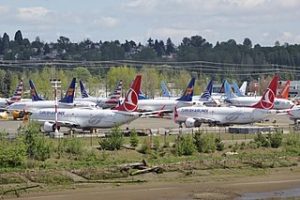Following Whistleblower Testimony, FAA Administrator Vows to Investigate Boeing

Ed Pierson, a former Boeing manager turned whistleblower, testified before Congress on Wednesday, December 11, 2019, that the Boeing plant where the company’s 737 Max was produced was a “factory in chaos,” with production issues that may have played a role in two crashes that killed a total of 346 people. Pierson, who worked for Boeing from 2008 until his retirement in 2018, is represented by the whistleblower practice at Constantine Cannon. He spoke before the House Transportation and Infrastructure Committee, which is investigating the 737 Max following a Lion Air crash in October 2108 and an Ethiopian Airlines crash in March 2019. The FAA grounded the 737 Max after the Ethiopia crash.
Pierson made seven recommendations to the committee, including a recommendation that the committee direct the FAA to conduct a comprehensive investigation of the Renton facility. Responding to bipartisan questions addressing Pierson’s allegations, FAA administrator Stephen Dickson pledged to examine the production process at the Renton, Washington factory and report back to the committee within sixty days.
“After 18 months, our client Ed Pierson finally decided to go public with his alarm about the chaotic conditions at Boeing’s Renton, Washington, factory,” said Constantine Cannon attorney Eric Havian. “Four months before the first of two fatal crashes of 737 Max airplanes, he warned Boeing that it should temporarily shut down the factory. He reported to Boeing management, then to its CEO, then its board of directors, none of whom acted on his warnings. Instead, he was told that Boeing was a profit-making enterprise. The response from regulators was similar indifference, after our client reported his concerns to the NTSB, the FAA, and the Department of Transportation.”
“Today, under pressure from sharp questioning by Congressmen Sean Maloney, Mark Meadows, and Albio Sires, the FAA committed for the first time to conduct a full investigation of production conditions at the Boeing Factory. All three Congressmen cited Mr. Pierson’s testimony as the basis for their demand for investigation. It is about time that the FAA took the keys to the airplanes away from Boeing.”
Pierson Testimony Identifies Safety Incidents and Dysfunctional Production Conditions
“I remain gravely concerned that the dysfunctional production conditions may have contributed to the tragic 737 Max crashes and that the flying public will remain at risk unless this unstable production environment is rigorously investigated and closely monitored by regulators on an ongoing basis,” Pierson testified. (Download Pierson written testimony)
Pierson identified 13 other safety incidents involving 737 Max planes just weeks or months into their service life. Altogether, one out of every 25 of the MAX planes has had a safety incident. Boeing had publicly stated it wanted to increase production at the plant from 47 to 52 planes per month. “By June 2018, I had grown gravely concerned that Boeing was prioritizing production speed over quality and safety,” Pierson said.
According to Pierson, the pressure to increase production was so great that it may have contributed to faulty systems that were on the planes. Further, there are hundreds of planes made in the same period of chaos still flying with potentially faulty Angle of Attack (AOA) sensors, putting the flying public at risk.
“I witnessed a factory in chaos and reported serious concerns about production quality to senior Boeing leadership months before the first crash,” said Pierson in his prepared remarks. “I formally reported again before the second crash. No action was taken in response to either of my reports.”
The increase in production meant the factory doubled its overtime rate, leading some employees to work more than five weeks straight without a day off. A backlog in plane parts led to work performed in an area or time other than that planned for (“out of sequence”). Canceling certain daily meetings meant a lack of communication about the work completed each shift. “Unsurprisingly, the confluence of parts delays, employee fatigue, out-of-sequence work, communications breakdowns, and schedule pressure led to a decline in quality,” Pierson testified.
Pierson detailed his repeated efforts from the summer of 2018 to the spring of 2019 to get Boeing management to address his concerns including writing to Chairman Dennis Muilenburg and the board of directors. Following the second crash, Pierson reached out to the National Transportation Safety Board (NTSB), the FAA and the Department of Transportation (DOT) to look into conditions at the Boeing factory. His concerns were rebuffed by every agency.
Additional Coverage
Earlier this week, Pierson was interviewed by reporters for NBC News, the Today Show, and The New York Times. Pierson’s Today Show appearance, with Havian, can be seen below.
Read More:
- The Constantine Cannon Whistleblower Group
- Think you have a whistleblower case?
- Whistleblower FAQs
- Contact us for a confidential consultation
Tagged in: CC Lawyers, Importance of Whistleblowers, Reporting to Government, Whistleblower Protection Laws,
Another Matter of Massive Faulty B737 Safety Parts not dealt with